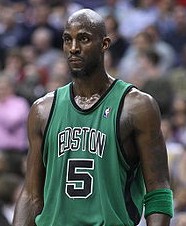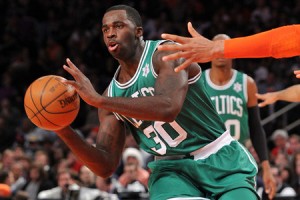 The other day, I was stuck behind the Boston Celtics on the highway.
The other day, I was stuck behind the Boston Celtics on the highway.
I was in the left lane and I wanted to go considerably faster than the car in front of me, who was doing about 60. Against my better judgment, I got up on his tail and applied some pressure, but he refused to go any faster or move into the right lane.
Somewhat annoyed, I drove right behind him for about a quarter-mile before a gap opened in the right lane. As I went around the slower car, I took a peek into its front seat and saw a driver considerably older than the speed limit, tenaciously clutching the steering wheel, looking only straight ahead.
This is who the Celtics have become.
In a league that quickly is becoming no country for old men, they are too something – determined, proud, stubborn, entitled – to simply move aside and let the young whippersnappers blow past them. Instead, they are trying to get everyone else to slow the heck down so they can keep up.
You know that old adage about enjoying the journey? That’s not the Celtics, who are just trying to survive the trek in one piece and get to their destination. They don’t give a rat’s asterisk whom they inconvenience, annoy or aggravate along the way.
And you know what? They’re pretty good at it. But you have to wonder how long they can keep it up.
The Celtics are nearing the end of an unforgiving road trip – 13 days, eight games, four time zones, three back-to-backs – that has clearly illustrated how they must play to be successful. When they are able to keep the tempo at a manageable speed, they can beat nearly anybody. When the opponent is able to push the pace, they look older than platform shoes.
Boston is 3-3 on its trip. Wins over the LA Clippers and Atlanta were grinders, with plenty of chippy play and all the flow of tree sap. In losses to Sacramento and Denver, the Celtics looked like the Red Auerbach statue in Faneuil Hall.
“I don’t know why we look like we’re running in mud these days,” Kevin Garnett said. “But our fight’s there, man.”
During Monday’s win over Atlanta, Celtics analyst Donny Marshall stopped gushing and cheerleading long enough to make an interesting point: The Celtics seem to have an easier time keeping their focus and executing better on both ends when the pace is slower. When the game quickens, they give away possessions on offense and let down their guard on defense, mistakenly believing that the increased number of opportunities will allow them to make up for their miscues.
After the 25-point loss at Sacramento, Pierce admitted, “We got caught up in what they like to do, the running game.”
Tempering the tempo doesn’t assure victory for the Celtics, as they found out with a last-minute loss to the LA Lakers that opened the trip. Conversely, playing at pace isn’t necessarily a recipe for failure, either, as a last-second win over ADD-afflicated Golden State three nights later proved.
But to a man, the Celtics know they are better off when they are dictating speed and flow. It is evident in their half-court offense, where they run their sets to precision and almost always make the extra pass. It is even more obvious in their defense, which blitzes, fronts, chips, jams, grabs – anything to make things miserable for their foes.
“We have to understand who we are – we’re a defensive group,” Paul Pierce said.
The conventional numbers bear that out. The Celtics are 26th in scoring at just 91.1 points per game. Only Toronto, Detroit, New Orleans and Charlotte – combined star players: zero – average less.
Part of the issue is Boston’s inability to get to the line. The Celtics rank 27th at 20.1 free throws per game, and Pierce (5.7) is their only player in the top 50.
And with a pace ranking 22nd in the league, Boston appears to be maximizing its touches. Despite their low scoring average, the Celtics are seventh in shooting (.455), eighth in 3-point shooting (.364) and second in assists (23.3). So when they have the ball, they know what to do to get it in the basket.
But it’s that whole “having the ball” thing that is presenting problems.
Boston is dead last in the NBA at 38.1 rebounds per game. More meaningful is rebound percentage, and the Celtics are 24th defensively, last offensively and 29th overall, ahead of only league-worst Charlotte.
Rebounding completes stops and offers the opportunity to run. The Celtics are wasting valuable energy making multiple stops while being unable to get easy transition baskets or second-chance points.
This extra expenditure of effort is taking its toll on the current rotation. Even at full strength, no  one would describe the Celtics as spry. Without big men Jeff Green, Jermaine O’Neal and Chris Wilcox, the effect on the rotation is evident. Boston is 1-7 when the second of back-to-back games is on the road.
one would describe the Celtics as spry. Without big men Jeff Green, Jermaine O’Neal and Chris Wilcox, the effect on the rotation is evident. Boston is 1-7 when the second of back-to-back games is on the road.
Garnett is playing out of position at center and is being spelled by rookie Greg Stiemsma, a shaky postseason notion. Pierce and Mickael Pietrus are taking occasional turns at power forward because Rivers has only three bigs he truly trusts. Backup guards Keyon Dooling and Avery Bradley are good defenders but don’t contribute at the other end.
There has been a lot of talk about Boston adding a big man released or bought out by Friday’s deadline. But former Celtic stringbean Chris Johnson already has been waived by Portland and claimed by New Orleans. Ronny Turiaf is taking his talents to South Beach. J.J. Hickson went to Portland. Boris Diaw may be headed to San Antonio. And Ryan Hollins doesn’t have the defensive discipline.
Also keep in mind that the Celtics already have 15 players and would have to cut a guaranteed contract to add a player. When your payroll is a league-high $87 million –$17 million above the projected luxury tax threshold, adding salary is cause for pause.
In other words, Robert Parish is not walking through that door.
Boston’s trip mercifully ends this week with huge back-to-back games at Milwaukee and Philadelphia. The Celts are three games ahead of the surging Bucks and 1 1/2 behind the scrappy Sixers, who ran them out of the Broad Street gym the last time Gang Green started sniffing around first place.
And just in case you were wondering, these are Boston’s first seven games in April, played over 11 days with three back-to-backs: vs. Miami, vs. San Antonio, at Chicago, at Indiana, vs. Philadelphia, at Miami, vs. Atlanta. That is followed by three road games in three nights, a day off, and a visit to New York.
As Tony Montana once said, that’s no duckwalk.
The Celtics believe they can be a factor in the postseason, and anyone who dismisses an experienced team with a strong championship pedigree is kidding themselves. But they have to get there first, and it appears the only way is under the caution flag. Any faster and they might lose control and crash.
Or as Rivers put it, “I’m trying to get our team to understand we don’t have a margin for error.”
Chris Bernucca is a regular contributor to SheridanHoops.com. His columns appear every Wednesday and Sunday. You can follow him on Twitter.